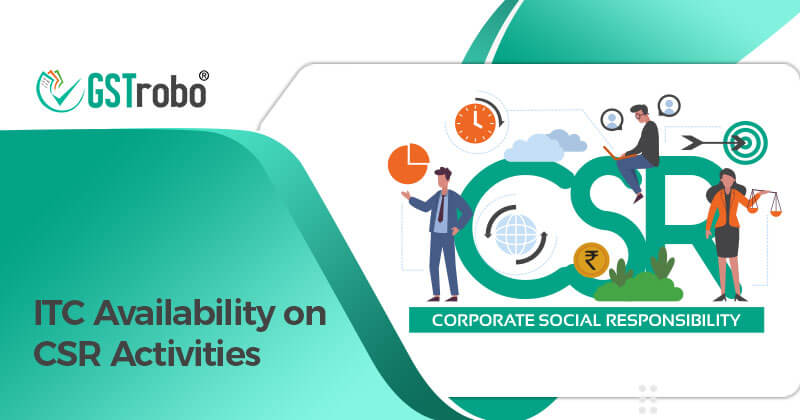ITC Availability on CSR Activities
Corporate Social Responsibility (CSR) is defined as a company’s voluntary contribution to a better society and a cleaner environment through projects or programs. In this blog, we will cover all the aspects related to ITC availability on CSR activities.

What is Corporate Social Responsibility?
Every company is expected to comply with the CSR standards under Section 135(5) of the Companies Act. The following are the companies that have been identified:
The Act requires every corporation that has any of the following during the previous fiscal year to comply with the Act’s Corporate Social Responsibility requirements:
- A net worth of at least INR 500 crore
- Revenue of at least INR 1,000 crore
- A net profit of at least INR 5 crore
Following its Corporate Social Responsibility Policy, a corporation is expected to invest at least 2% of its average net income over the preceding three fiscal years in each fiscal year. The following are examples of substantial expenditures covered by Corporate Social Responsibility activities:
- Providing educational opportunities
- Gender equality promotion
- Projects relating to the development of rural areas
- PM Cares Fund contribution
- Contribution towards environmental protection
- Promotion of COVID-19 related healthcare, prevention, and sanitation activities
- Events relating to disaster management, such as relief efforts
ITC Availability on CSR Activities – 1st Theory
The first theory holds that there is no ITC available for CSR activity.
Let us first review some of the key GST (Goods and Service Tax) definitions to better comprehend the availability of ITC for CSR activities.
1) Supply: Under GST, supply is a taxable event. The obligation to pay GST arises at the time when goods or services are supplied. The following items are included in the supply:
Sale, Transfer, Exchange, Barter, License, Rental Lease, and Disposal are all options.
Anyone who engages in any of the aforementioned activities falls under the GST definition of supply. A provision of goods or services, or both, that is subject to tax under the GST Act is referred to as a further taxable supply.
2) Goods: The term “goods” refers to all types of transportable property. Actionable claims, growing crops, grass, and items belonging to or forming part of the land are all included. Money and securities, on the other hand, are not included.
3) Services: Services are any activity that is not related to products, money, or securities. It encompasses all acts involving the usage of money or the transformation of money from one form to another. This is charged as a separate consideration.
4) Business: Any activity carried out by a person for a monetary advantage, including trade, commerce, manufacture, profession, vocation, adventure, or wager, is considered a business.
Section 17(2) of the CGST (Central Goods and Services Tax) Act has provisions related to the input tax credit requirements. Only if the outputs are taxable supply, the taxes paid on inputs can be claimed as ITC. ITC is also not accessible for goods that are lost, stolen, destroyed, written off, or given away as gifts or free samples, according to section 17(5) – Block Credit.
A company’s outputs/output services are provided free of charge in the event of Corporate Social Responsibility activities. Input credit cannot be claimed on CSR activities because of the definition of taxable supply and the provisions of section 17(2).
Furthermore, any expenditure incurred by the taxpayer for CSR activities cannot be for business or profession under Section 37 of the Income Tax Act. As a result, it cannot be claimed as a business expense. If the expenditure is not for a business purpose, the ITC cannot be claimed.
ITC Availability on CSR activities- 2nd Theory
The second theory, ITC is available for CSR activities because they are incurred during the business. CSR efforts have a significant impact on a company’s image and are also required under the Companies Act of 2013. It improves the company’s reputation and generates goodwill. As a result, it can be determined that CSR activities are carried out during or in furtherance of the business. Hence, ITC can be claimed for such occasions.
